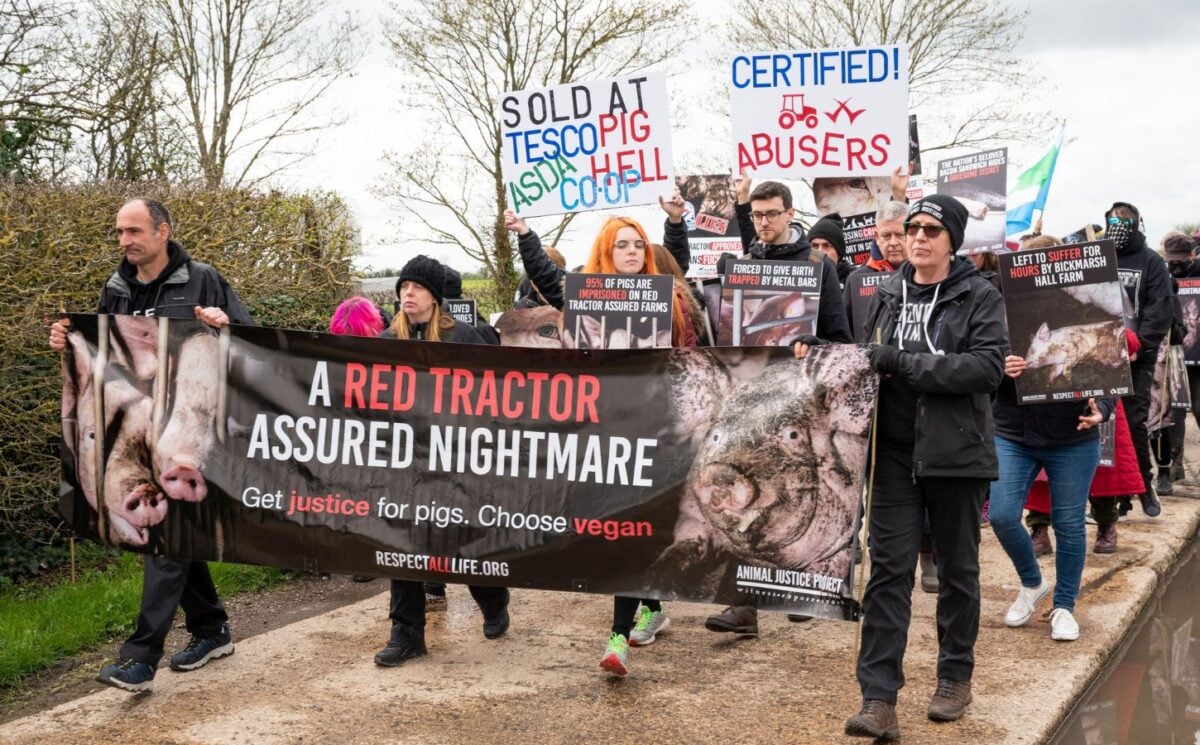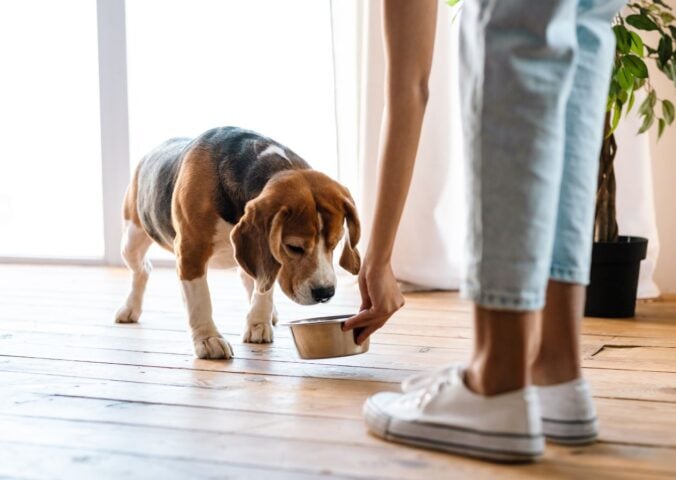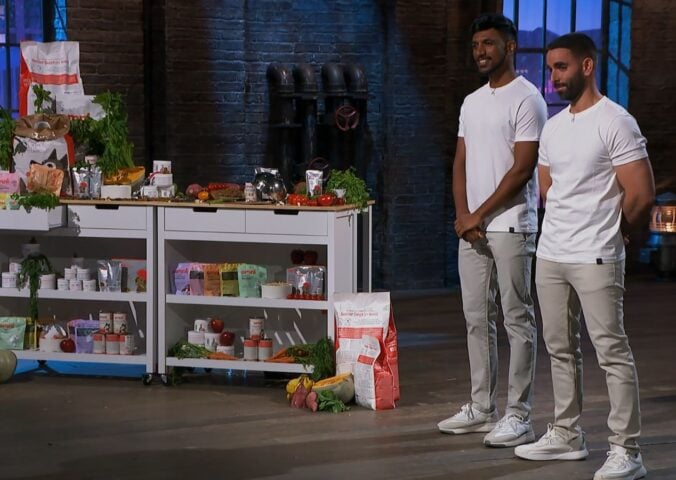Stroll down the aisles of a British supermarket and you will see the Red Tractor logo on everything from milk bottles to carrots. The label assures customers that food and drink products have been produced in the UK to Red Tractor’s standards. According to Red Tractor, this means that food has been “responsibly sourced, safely produced and comes from crops and animals that have been well cared for.”
Red Tractor is one of several farm assurance schemes operating in the UK. It certifies nearly 50,000 British farmers, covering the vast majority of the country’s animal farms.
Here we delve into what Red Tractor does, what it’s animal welfare standards are, and whether the scheme is effective at protecting farmed animals.
How Red Tractor works
Red Tractor started in 2000 to restore trust in British produce following outbreaks of BSE (known as Mad Cow Disease) and Foot and Mouth in the 1990s. The scheme sets standards across different areas of food production. Farmers and food companies pay to join the scheme, agreeing to farm inspections to make sure they adhere to the scheme’s standards.
Red Tractor uses more than 350 inspectors from independent companies to carry out farm inspections. It says that they complete around 60,000 inspections each year. Farms can be suspended from the scheme if they fail to comply with standards. They are then typically given the chance to make changes to have their certification reinstated.
There are several Red Tractor logos denoting different levels of animal welfare. “Certified Standards” is for products meeting the basic standards. The “Enhance Welfare” logo is specifically for chicken products from farms with “additional welfare requirements.” More space and slower growing breeds of chicken, for example. “Free Range” means the chickens or other farms birds can go outside for at least half their life.
Animal welfare
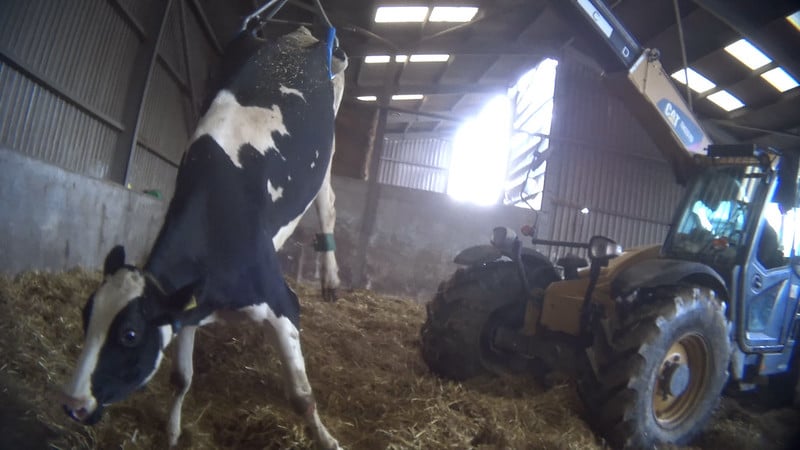
UK law specifies the minimum standards that must be met on farms and in slaughterhouses. Red Tractor’s basic standards are just slightly above the legal ones. Red Tractor certifies intensive animal farms as well as “free range” ones.
Aside from providing for the essential needs of animals, farmers are supposed to supply species-appropriate “environmental enrichment.” This includes features such as perches for chickens or straw and hay for pigs to root in.
When animals need to be handled – for example, when being moved for transporting – this must be done in a way that minimizes stress and avoids injuring them. If they become sick or injured they are supposed to receive prompt medical attention and not left to suffer.
Red Tractor farms are allowed to use procedures that are known to be painful and stressful for animals. Cutting off piglets’ tails or clipping their teeth to prevent tail biting can be done without pain relief as a “last resort.” Chickens cannot have their beaks trimmed, but turkeys can.
These types of procedures only “need” to be carried out because the animals become stressed in cramped intensive farming conditions. Tail biting, for instance, is rarely seen among pigs living outdoors in more natural conditions.
Enforcement issues
Sixty thousand farm inspections a year sounds like a lot. But with nearly that many farms to inspect, it amounts to slightly more than one inspection a year per farm. These visits are usually pre-arranged. In 2019, Red Tractor brought in a new inspection regime to increase unannounced visits to farms it deemed to be falling short of its standards.
According to Red Tractor, it suspended 3,000 farms from its scheme in 2020 for not meeting its standards.
Nonetheless, inspectors appear to be failing to spot problems on many farms. Multiple undercover investigations have uncovered breaches of Red Tractor animal welfare standards on throughout the UK.
Abuse and poor conditions revealed
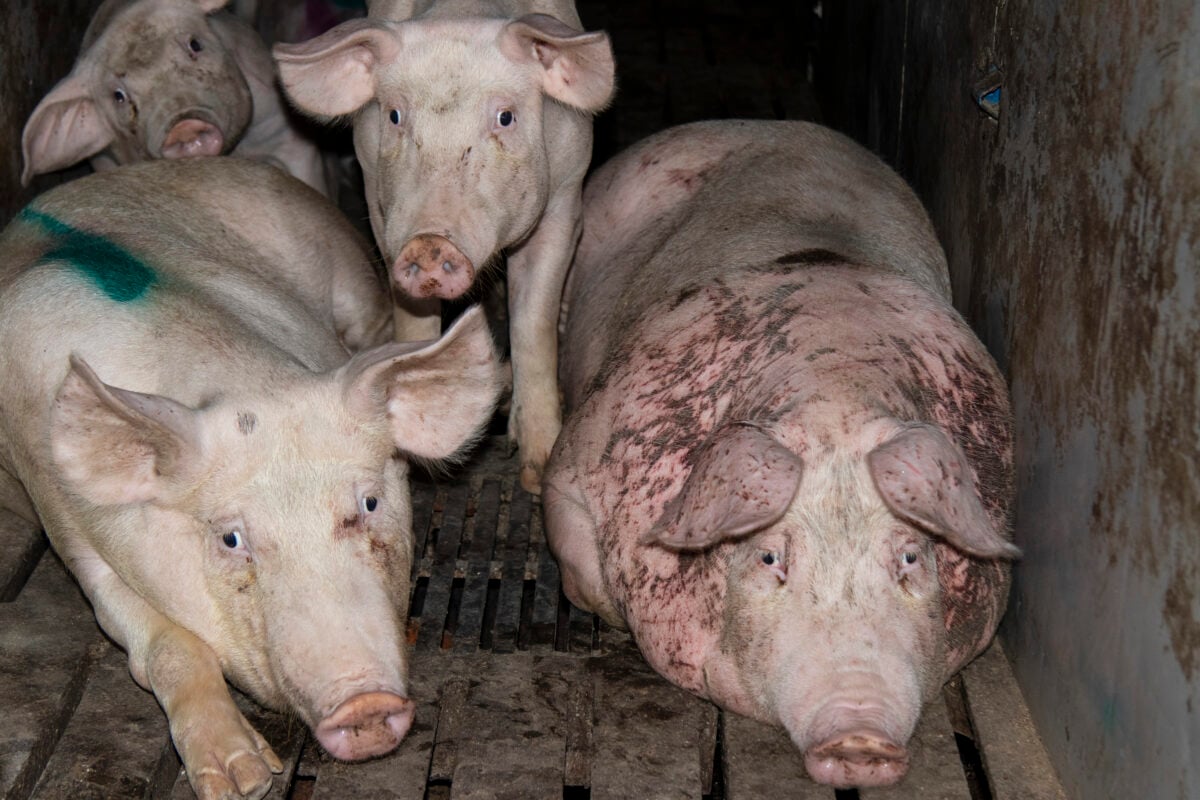
Animal advocacy groups including Animal Equality, Viva!, and Animal Justice Project have used hidden cameras and undercover workers to document conditions on Red Tractor approved farms.
In 2019, Animal Equality investigated a huge intensive chicken farm in Lincolnshire. Investigators found chickens suffering from severe leg injuries and dead birds left to rot for days amongst the flocks of living birds. Several investigations by Viva! into Hogwood, a pig farm in Warwickshire, revealed horrific abuse of pigs by workers. According to Viva!, pigs cannibalized each other and were left to suffer with bleeding injuries and ill animals were abandoned to die slowly in a separate shed.
Footage from another investigation by Animal Equality famously made it onto an episode of BBC’s Panorama program. On a Welsh dairy farm, workers were filmed hitting and kicking cows and dragging lame cows across concrete floors.
This is just a handful of examples of investigations which continuously uncover poor welfare standards on animal farms. In addition to these more egregious examples, mutilations which are supposed to be a “last resort” are actually often done routinely. A 2022 report by Animal Equality and The Animal Law Foundation showed that tail docking is carried out routinely on more than 70 percent of UK pig farms.
Bad farms reinstated
Red Tractor says it investigates any breaches of its standards that are brought to its attention. In several cases when an investigation has revealed breaches, it has claimed to have found no evidence of wrongdoing. That is what happened after an investigation at a chicken farm found chickens deemed “unprofitable” being left to starve and dehydrate, for example.
In other cases, Red Tractor has suspended the farm in question only to reinstate it to the certification scheme later. The dairy farm that featured on Panorama was allowed to rejoin Red Tractor mere months after it terminated the farm’s membership.
Sometimes, it takes enormous public pressure before Red Tractor acts. Viva! investigated Hogwood four times between 2017 and 2019, but it wasn’t until 2019 that Red Tractor (and Tesco, which the farm supplied meat to) cut ties with it.
Viva! says that Red Tractor is swifter to suspect farms than it used to be after such high profile investigations. But the scheme “approves farms of an appallingly low standard,” Viva! says on its website, and “only takes action when their PR may be affected, not when animals are clearly in pain.”
A systemic problem?
Animal advocates say that cases of animals being abused and neglected on British farms are not isolated incidents.
Dr. Alice Brough, a former pig industry veterinarian turned vegan activist, has said that “the serious health and welfare issues” found on one pig farm in 2021 “reflect much wider concerns across the industry.”
Advocates worry that all Red Tractor does is reassure customers who don’t usually get to see what really goes on inside farms. In the view of Viva!, “Red Tractor is a sham label which means very little for animals.”
